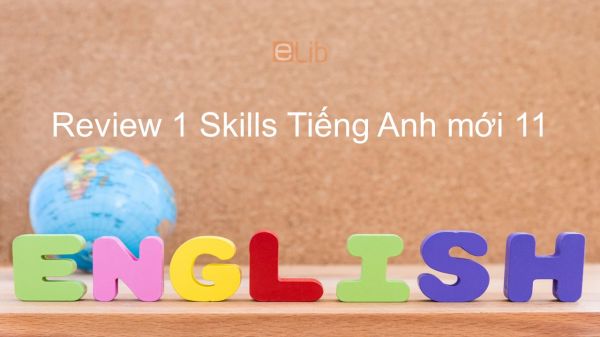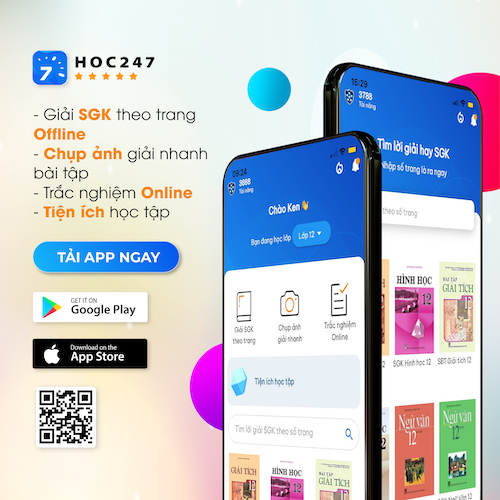Review 1 lớp 11 - Skills
Bài học Review 1 lớp 11 phần Skills hệ thống kiến thức đã học trong các Unit 1, 2, 3 giúp các em ôn luyện các kĩ năng đọc hiểu, nói, nghe hiểu và viết. Mời các em cùng tham khảo!
Mục lục nội dung

Review 1 lớp 11 - Skills
1. Reading
1.1. Task 1 Review 1 lớp 11
Read and complete the text with the words from the box. (Đọc và hoàn thành đoạn văn bằng từ cho trong khung)
|
possibility unemployment practical decisions hopefully straight advantage qualifications |
Guide to answer
THE MOST IMPORTANT DECISION
Around the age of seventeen, you have to make one of the most important (1) decisions in your life. Do you stay on at school and (2) hopefully go to university later? Or do you leave school to start work or a training course? This is your decision, but you should remember two things: there is more (3) unemployment among young people who have not been to university, and people with the right skills have a big (4) advantage in the job market. If you make the decision to go (5) straight into a job, there are many opportunities for training. While you are earning, you can also take evening classes to gain (6) qualifications, which will help you to get ahead in your career more quickly. Another (7) possibility is that you start work and take a break to study when you are older. This is the best way to save up money for your studies, and get (8) practical experience.
Tạm dịch
QUYẾT ĐỊNH QUAN TRỌNG NHẤT
Khoảng mười bảy tuổi, bạn phải thực hiện một trong những quyết định quan trọng nhất trong cuộc đời bạn. Bạn có ở lại trường học và hy vọng đi học đại học? Hay bạn bỏ học để bắt đầu công việc hoặc một khóa dạy nghề? Đây là quyết định của bạn, nhưng bạn nên nhớ hai điều: ngày càng nhiều người thất nghiệp trong số những người trẻ tuổi không đi học, và những người có kỹ năng phải có một lợi thế lớn trong thị trường lao động. Nếu bạn quyết định làm ngay, có rất nhiều cơ hội để đào tạo. Trong khi bạn kiếm được, bạn cũng có thể tham dự các lớp học buổi tối để có được bằng cấp, điều này sẽ giúp bạn đạt được trong sự nghiệp của bạn nhanh hơn. Một điều có thể là bạn bắt đầu làm việc và nghỉ ngơi để học tập khi bạn lớn hơn. Đây là cách tốt nhất để tiết kiệm tiền cho việc học tập của bạn, và có được kinh nghiệm thực tiễn.
1.2. Task 2 Review 1 lớp 11
Read the text again and answer the questions. (Đọc lại bài đọc và trả lời câu hỏi.)
1. When do you have to make one of the biggest decisions in your life? (Khi nào bạn phải thực hiện một trong những quyết định lớn nhất trong cuộc đời?)
2. What are the job prospects for people who haven't been to university? (Triển vọng việc làm cho những người không học đại học là gì?)
3. What is the advantage of having the right skills? (Lợi thế của việc có các kỹ năng phù hợp là gì?)
4. What opportunities are there for you if you decide to go straight into a job? (Có cơ hội nào cho bạn nếu bạn quyết định đi làm ngay?)
Guide to answer
1. Around the age of seventeen. (Khoảng 17 tuổi.)
2. There is more unemployment. (Nhiều người thất nghiệp hơn.)
3. Getting a job more easily. (Kiếm việc làm dễ dàng hơn.)
4. There are many opportunities for training. (Có nhiều cơ hội được đào tạo.)
2. Speaking
Work with your partner. Make a conversation about your friend's problem and give them advice. Use your own ideas or the suggestions below. (Làm việc với bạn bên cạnh, nói chuyện về vấn đề bạn em đang gặp phải và cho họ lời khuyên. Dùng ý tưởng của em hoặc những gợi ý dưới đây.)
Your friend’s problem:
– getting bad exam results
Your advice:
– spend less time surfing the Internet for pleasure
– spend more time searching information for assignments
– work harder
– ask a teacher for extra tuition
Tạm dịch
Vấn đề của bạn của bạn:
- đạt kết quả kém trong kỷ thi
Lời khuyên của bạn:
- dành ít thời gian lên mạng tìm thú vui
- dành nhiều thời gian hơn tìm thông tin cho bài tập
- học chăm hơn
- nhờ giáo viên kèm thêm
Guide to answer
Minh: Hand, what is the matter with you?
Ha: I got bad exam results. I am very sad and disappointed.
Minh: I know that, but don't worry too much.
Ha: Can you give me some advice to improve my study results?
Minh: I think you should study harder and spend more time researching information for assignments instead of leisure activities. When you have a problem, you can ask other friends or teachers for help. Besides, you can find a tutor at home. If you try your best, you can get good scores on the next exams.
Ha: I see. Those are good ideas. Thanks Min!
Minh: You’re welcome, Hand.
Tạm dịch
Minh: Hand, có chuyện gì với bạn vậy?
Hà: Bài thi của tớ bị điểm kém. Tớ rất buồn và thất vọng.
Minh: Tớ hiểu điều đó, nhưng đừng lo lắng quá nhé.
Hà: Bạn có thể cho tớ một số lời khuyên để tớ có thể cải thiện kết quả học tập của tớ không?
Minh: Tớ nghĩ bạn nên học tập chăm chỉ hơn, dành nhiều thời gian nghiên cứu thông tin cho bài tập thay vì tìm niềm vui. Khi bạn gặp vấn đề nào đó, bạn có thể nhờ các bạn khác hoặc giáo viên trợ giúp. Bên cạnh đó, bạn có thể tìm một gia sư dạy kèm ở nhà. Nếu bạn cố gắng hết sức, bạn có thể đạt được điểm số cao trong các kỳ thi tiếp theo.
Hà: Tớ hiểu rồi. Đó thực là những ý kiến hay. Cảm ơn Min!
Minh: Không có gì, Hand.
3. Listening
Listen to the recording about relationship problems between parents and teenage I children. Decide whether the following statements arc true (T), or false (F) according I to the speaker. (Hãy nghe đoạn ghi âm nói về những vấn đề trong quan hệ giữa cha mẹ và con cái tuổi mới lớn và xem thứ những lời phát biểu đó là đúng hay sai theo ý kiến trong đoạn ghi âm.)
Click to listen
Guide to answer
1 – T. Parents sometimes find it hard to talk to their teenage children. (Cha mẹ đôi khi gặp khó khăn khi nói chuyện với con cái ở tuổi thanh thiếu niên.)
Thông tin: During the teenage years, it is at times difficult for parents to talk to their children.
2 – F. Teenagers always like talking about their school work. (Thanh thiếu niên luôn thích nói về bài vở, công việc của họ ở trường.)
Thông tin: They seem unwilling to talk about their work at school.
3 – T. Teenagers hate questions that aim to check up on them. (Thanh thiếu niên ghét các câu hỏi nhằm kiểm tra chúng.)
Thông tin: Young people often dislike talking if they realise that parents are trying to check up on them.
4 – F. Parents should push their teenage children to talk about school, work and future plans, if necessary. (Các bậc cha mẹ nên thúc ép các con của mình nói về trường học, công việc và các kế hoạch tương lai, nếu cần.)
Thông tin: Parents should find ways to talk to their teenage children about school, work and future plans, but should not push them to talk if they don't want to.
5 – T. Parents should watch for danger signs in some teenagers who may smoke or try using drugs or alcohol. (Các bậc cha mẹ nên theo dõi các dấu hiệu nguy hiểm ở một số thanh thiếu niên có khả năng hút thuốc hoặc thử sử dụng ma túy hoặc rượu.)
Thông tin: Some teenagers in trying to be adults may experiment with alcohol, drugs or smoking. It is necessary for parents to watch for any signs of different behaviour, which may be connected with these dangers and offer help if necessary.
Audio Script
During the teenage years, it is at times difficult for parents to talk to their children.! Teenagers often seem to hate being questioned. They seem unwilling to talk about their work at school. This is a normal psychological development at this age. Although it can be hard for parents to understand, it is part of becoming independent. Teenagers are trying to be adults while they are still growing up. Young people often dislike talking if they realise that parents are trying to check up on them. Parents should find ways to talkl to their teenage children about school, work and future plans, but should not push them tol talk if they don't want to Parents should also watch for danger signs. For example, some teenagers in trying to bo adults may experiment with alcohol, drugs or smoking. It is necessary for parents to watch for any signs of different behaviour, which may be connected with these dangers and offer help if necessary.
Dịch Script
Trong những năm thiếu niên, đôi khi cha mẹ khó nói chuyện với con mình. Thanh thiếu niên thường dường như ghét bị tra hỏi. Họ dường như không muốn nói về việc của họ ở trường. Đây là một sự phát triển tâm lý bình thường ở tuổi này. Mặc dù cha mẹ có thể khó hiểu nhưng nó là một phần của việc trở nên tự lập. Thanh thiếu niên đang cố gắng để được trưởng thành trong khi họ vẫn còn lớn lên. Những người trẻ tuổi thường không thích nói chuyện nếu họ nhận ra rằng cha mẹ đang cố gắng kiểm tra chúng. Cha mẹ nên tìm cách nói chuyện với con cái tuổi vị thành niên về trường học, công việc và các kế hoạch tương lai, nhưng không nên ép họ nói chuyện nếu họ không muốn Cha mẹ cũng nên theo dõi các dấu hiệu nguy hiểm. Ví dụ, một số thanh thiếu niên cố gắng để học làm người lớn như thử nghiệm với rượu, ma túy hoặc hút thuốc lá. Phụ huynh cần phải theo dõi bất kỳ dấu hiệu nào của hành vi khác nhau, có thể là liên quan đến những nguy hiểm này và giúp đỡ nếu cần.
4. Writing
4.1. Task 1 Review 1 lớp 11
Read the advertisements and choose one of the language schools you want to attend to improve your English. (Hãy đọc những phần quảng cáo rồi chọn một trong những trường dạy ngoại ngữ em muốn theo học để nâng cao vốn tiếng Anh của mình)
Review 1 Skills
Tạm dịch
1. Trung tâm ngôn ngữ Anh
Tại sao không học nói tiếng Anh với người bản ngữ?
Chúng tôi có giáo viên chất lượng và các lớp học yêu cầu trong các buổi tối và cuối tuần.
Để biết thêm thông tin, gửi thư tới Cô Helen Smith, số 218 Tây Sơn, Hà Nội.
2. Học viện ngoại ngữ
Học tiếng Anh, tiếng Pháp, tiếng Trung Quốc, tiếng Nhật vào các buổi sáng và tối.
Địa điểm cho các lớp học sơ cấp/ cơ bản / trung cấp.
Để biết thêm thông tin, liên lạc với chúng tôi:
Số điện thoại: (04) 55555339
Địa chỉ: Ông Bill Weston, số 26 đường Thái Hà, Hà Nội.
4.2. Task 2 Review 1 lớp 11
Write a letter requesting more information about the language courses. You can ask about the starting date, course duration, teachers' experience, fees and course certificate. (Em hãy viết một bức thư yêu cầu cho biết thêm thông tin về các khóa học ngoại ngữ. Em có thể yêu cầu về ngày bắt đầu học, thời gian ca khóa học, kinh nghiệm của giáo viên, học phí và chứng chỉ của khóa học.)
Guide to answer
Dear Ms Helen,
I saw your advertisement about the language courses on your website. I am interested in learning English, and I am writing to enquire about the English courses at your center.
I can read and write in English, but I can't speak the language very well. If necessary. I can complete an oral test. I want to improve my pronunciation, and hope to be able to practise my English with native speakers.
I would also like to have more information about the starting date, course duration, teachers’ experience, fees and course certificate.
I look forward to hearing from you soon.
Your faithfully,
Tieu Yen
Tạm dịch
Cô Helen thân mến,
Tôi đã xem quảng cáo của bạn về các khóa học ngôn ngữ trên trang web của cô. Tôi quan tâm đến việc học tiếng Anh, và tôi viết thư để hỏi về các khóa học tiếng Anh tại trung tâm của cô.
Tôi có thể đọc và viết bằng tiếng Anh, nhưng tôi không thể nói giỏi. Nếu cần. Tôi có thể hoàn thành một bài kiểm tra miệng. Tôi muốn cải thiện cách phát âm của tôi, và hy vọng có thể thực hành tiếng Anh của tôi với người bản xứ.
Tôi cũng muốn có thêm thông tin về ngày bắt đầu, thời gian khóa học, kinh nghiệm của giáo viên, lệ phí và chứng chỉ khóa học.
Tôi mong sớm nhận được hồi âm từ cô.
Trân trọng,
Tiểu Yến
5. Practice Task 1
Read the following passage and mark the letter A, B, C, or D on your answer sheet to indicate the correct answer to each of the questions.
William Sydney Porter (1862-1910), who wrote under the pseudonym of O. Henry, was born in North Carolina. His only formal education was to attend his Aunt Lina’s school until the age of fifteen, where he developed his lifelong love of books. By 1881 he was a licensed pharmacist. However, within a year, on the recommendation of a medical colleague of his Father’s, Porter moved to La Salle County in Texas for two years herding sheep. During this time, Webster’s Unabridged Dictionary was his constant companion, and Porter gained a knowledge of ranch life that he later incorporated into many of his short stories. He then moved to Austin for three years, and during this time the first recorded use of his pseudonym appeared, allegedly derived from his habit of calling “Oh, Henry” to a family cat. In 1887, Porter married Athol Estes. He worked as a draftsman, then as a bank teller for the First National Bank.
In 1894 Porter founded his own humor weekly, the “Rolling Stone”, a venture that failed within a year, and later wrote a column for the Houston Daily Post. In the meantime, the First National Bank was examined, and the subsequent indictment of 1886 stated that Porter had embezzled funds. Porter then fled to New Orleans, and later to Honduras, leaving his wife and child in Austin. He returned in 1897 because of his wife’s continued ill-health, however she died six months later. Then, in 1898 Porter was found guilty and sentenced to five years imprisonment in Ohio. At the age of thirty five, he entered prison as a defeated man; he had lost his job, his home, his wife, and finally his freedom. He emerged from prison three years later, reborn as O. Henry, the pseudonym he now used to hide his true identity. He wrote at least twelve stories in jail, and after re-gaining his freedom, went to New York City, where he published more than 300 stories and gained fame as America’s favorite short Story writer. Porter married again in 1907, but after months of poor health, he died in New York City at the age of forty-eight in 1910. O. Henry’s stories have been translated all over the world.
Question 1: According to the passage, Porter’s Father was ______.
A. the person who gave him a life-long love of books
B. a medical doctor
C. a licensed pharmacist
D. responsible for his move to La Salle County in Texas
Question 2: Why did the author write the passage?
A. to outline the career of a famous American
B. because of his fame as America’s favorite short story writer
C. because it is a tragic story of a gifted writer
D. to outline the influences on O. Henry’s writing
Question 3: The word “imprisonment” in paragraph 2 is closet in meaning to _______.
A. captivity B. escape C. insult D. punishment
Question 4: What is the passage primarily about?
A. The life and career of William Sydney Porter.
B. The way to adopt a nickname.
C. O.Henry’s influence on American literature.
D. The adventures of O.Henry.
Question 5: The author implies which of the following is true?
A. Porter’s wife might have lived longer if he had not left her in Austin when he fled.
B. Porter was in poor health throughout his life.
C. O. Henry is as popular in many other countries as he is in America.
D. Porter would probably have written less stories if he had not been in prison for three years.
Question 6: Which of the following is true, according to the passage?
A. Porter left school at 15 to become a pharmacist
B. Porter wrote a column for the Houston Daily Post called “Rolling Stone”
C. The first recorded use of his pseudonym was in Austin
D. Both of Porter’s wives died before he died
Question 7: The word “pseudonym” in the passage refers to ___________.
A. William Sydney Porter B. O. Henry C. Athol Estes D. the Aunt Lina
6. Practice Task 2
Mark the letter A, B, C, or D to indicate the sentence that is closest in meaning to each of the following questions.
Question 1: “Don't touch the hot cooker," my mother said.
A. My mother promised me to touch the hot cooker.
B. My mother warned me not to touch the hot cooker.
C. My mother suggested me not touching the hot cooker.
D. My mother reminded me of touching the hot cooker.
Question 2: Stop giving me a hard time, I could not do anything about it.
A. Don't make me feel guilty because I couldn't do anything about it.
B. I could not do anything about it because I am going through a hard time.
C. Going through a hard time doesn't help me do anything about it.
D. I couldn't do anything about it so I would stop.
7. Conclusion
Kết thúc bài học, các em cần luyện tập các kĩ năng sau:
- Luyện đọc và trả lời câu hỏi
- Luyện tập tạo đoạn hội thoại và tập nói
- Luyện nghe và chọn đáp án đúng
- Luyện viết một lá thư hỏi về thông tin khóa học
Tham khảo thêm
- doc Review 1 lớp 11 - Language




